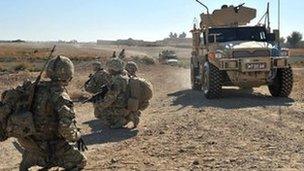Territorial Army 'to be renamed the Army Reserve'
- Published
- comments

The reservists will get much the same kit as the regular army, Mr Hammond says
The Territorial Army would be renamed the Army Reserve under plans unveiled by Defence Secretary Philip Hammond.
He told the BBC legislation would be needed for the change, which would also see territorials get regular Army kit, and train with full-time forces.
As part of the recent defence review, the numbers of regular soldiers is set to fall from 102,000 to 82,000, while reservists will double to 30,000.
He said the reservists would become an "integral part" of the Army.
Mr Hammond said he hoped that a number of those leaving the slimmed down regular forces would join the reserves and "help change the ethos".
Asked on the BBC's Andrew Marr Show if he was attempting to get an "army on the cheap", Mr Hammond said cutting the size of the regular army was "unfortunately one of the steps we had to take to rebalance the defence budget".
'Makes sense'
He said that it made sense for many of the support functions, like logistics, to be done by reservists because there was not such a great demand for them during peacetime.
The defence secretary said he wanted to see a name change - "in my head they are the Army Reserve, an integral part of the regular Army" - but added that the change would need to be approved by Parliament.
TA soldiers usually have full-time or part-time jobs and attend training sessions in their own free time. They are paid about £35 a day for each session.
They have to commit to between 19 and 27 training days a year and if they meet this commitment they get a tax-free lump sum called a bounty, which ranges from £424 to £2,098.
Travel to and from their units is also subsidised and they do not have to pay towards their kit.
Britain has had a reserve of part-time or retired soldiers - often known as yeomanry - since the Middle Ages but the system was only regularised in 1907 with the passing of legislation creating a Territorial Force.
It was mobilised just before World War I and its soldiers fought alongside regular soldiers in the trenches of northern France.
In 1920 it became the Territorial Army and in 1939 it was doubled in size as war clouds approached again.
The TA withered away during the 1960s but in 1971 it was reformed and expanded although its role remained unclear until the 1998 Strategic Defence Review.
As the regular Army became increasingly stretched in the early 21st century the TA became more important and 6,900 TA soldiers were mobilised for the invasion of Iraq in 2003.
In recent years it has also supported regular troops in Afghanistan and the Balkans.
- Published5 July 2012
- Published5 July 2012
- Published5 July 2012
- Published5 July 2012
- Published3 July 2013
- Published3 July 2012
- Published7 June 2012
- Published25 May 2012